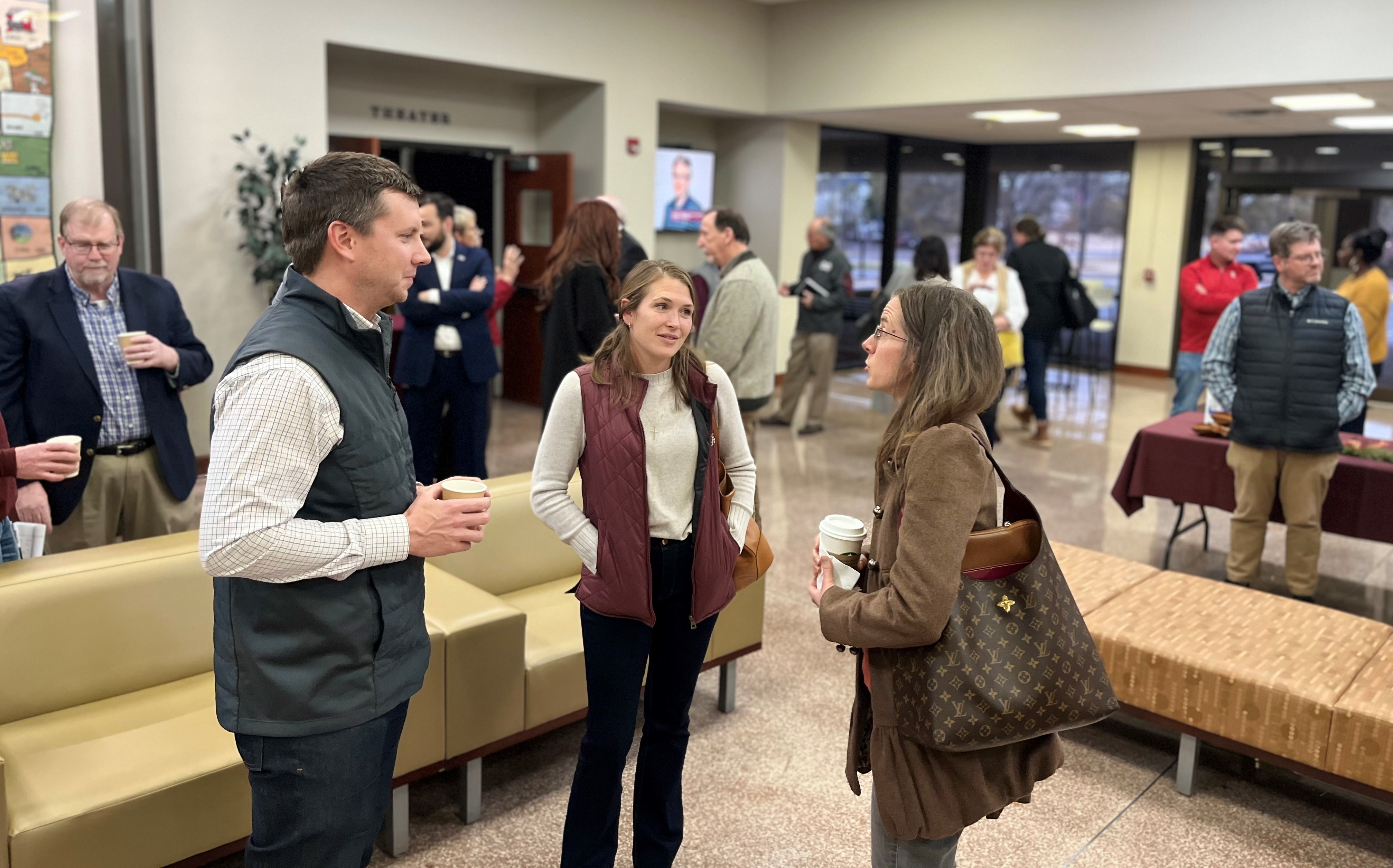Faculty in the Division of Agriculture, Forestry and Veterinary Medicine visit in Bost Conference Center following a meeting to review the mid-career faculty success report findings.
Teaching classes. Grading papers. Publishing research. Serving their communities.
For Mississippi State University faculty in the Division of Agriculture, Forestry and Veterinary Medicine or DAFVM it's a labor of love. It's their passion. For many, it's what they've always dreamed.
Still, as they pass the early career stage, expectations grow. Time seems to shrink.
“There are unique challenges faculty face, especially those at the mid-career level,” said DAFVM Associate Vice President Ashli Brown. “There are increased teaching and service expectations and growing research programs at this stage, and early career support programs are phased out.”
The term “mid-life crisis” may be a common phrase, but a “mid-career crisis” may also be very real. A 2022 Association of Public and Land-Grant Universities survey reported 43% of the workforce was considering leaving their jobs in the coming year.
As an MSU faculty member at the mid-career level, Beth Baker understands the challenge of balancing it all.
“One day I may be delivering a soil and water conservation program or talking with producers from around the state, and another I might be managing budgets or amending grants,” said Baker, an associate Extension professor in the Forest and Wildlife Research Center or FWRC. “In between those details, I need to zoom out and focus on moving projects forward. I think at the mid-career stage, you’re re-envisioning what areas you want to focus on and what is most sustainable for you.”
In addition to work responsibilities, faculty at the mid-career stage are often in a busy season of life.
With this in mind, a DAFVM project launched in 2022 exploring ways to assist faculty in navigating the shift between early and mid-careers. Leslie Burger, associate teaching professor in FWRC, was selected from a pool of applicants to lead the project.
“Mid-career faculty represent a significant investment of resources – start-up packages, early career training and salary,” said Burger. “When they leave, it creates gaps in meeting MSU’s mission and places additional pressure on those who remain. Supporting our faculty and retention go hand-in-hand.”
Burger shared her findings with administration and faculty in November 2023.
“Focus group participants report staying at MSU because of the collegial and flexible work environment, opportunities and backing for applied research and supportive leadership. We found that faculty are concerned about the impact of infrastructure issues and vacant positions have on their ability to compete for grants, manage their workload and achieve promotion,” explained Burger.
Josh Maples, associate professor and Extension economist, said this project is important because it is targeted at the career stage when faculty often have the ability and desire to consider other opportunities.
“Faculty at this stage have proven they have what it takes to earn promotion and/or tenure, and they may be in high demand by other universities or private industry because of their productivity. Obviously, we want these productive faculty to choose to stay at MSU,” said Maples.
Throughout the project, faculty made suggestions for changes they felt would better support them. One proposal, providing faculty the flexibility to adjust elements of their job description once they reach mid-career, resonated with Maples.
“After promotion and tenure, I think faculty generally have a much better idea of what they find rewarding and what they’d like to spend the rest of their career pursuing. There may be opportunities to retain faculty and improve success and satisfaction simply by shuffling appointments to better reflect what the faculty member enjoys (and excels at) doing,” Maples said.
Lauren Priddy, associate professor in agricultural and biological engineering, offered this suggestion: “Resources for grant writing, personnel, equipment, and sabbatical alternatives would benefit mid-career faculty as they expand and sustain their research programs. These mechanisms of support can facilitate recruitment and retention of mid-career faculty, which is important for their growth into leadership roles.”
Burger continues to collect feedback from faculty, and DAFVM unit leaders have begun to implement some changes as a result of the project’s findings.
“‘Taking care of our faculty’ is a theme that has shown up more and more over time,” said Keith Coble, DAFVM Vice President. “This project has worked out to be quite synergistic with the university’s transformational change conversation and will carry forward into our strategic plan.”
Mississippi State University is taking care of what matters. Learn more at www.msstate.edu.

